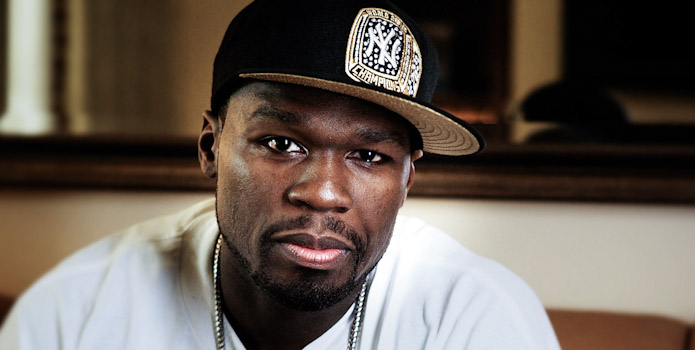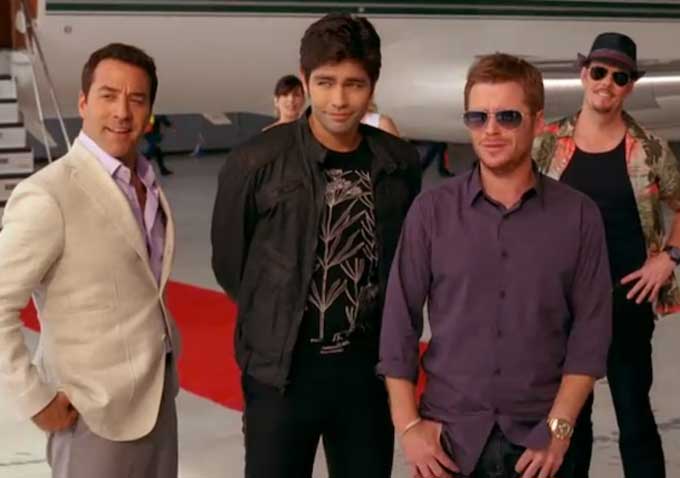By providing your information, you agree to our Terms of Use and our Privacy Policy. We use vendors that may also process your information to help provide our services. This site is protected by reCAPTCHA Enterprise and the Google Privacy Policy and Terms of Service apply.
Matthew Cooke On His Provocative Documentary ‘How To Make Money Selling Drugs’ and Enlisting the Help of Drug Dealers
Julia Selinger

Matthew Cooke’s documentary “How To Make Money Selling Drugs” is just as provocative and informative as the title suggests. The slickly produced film functions as a how-to guide for blossoming drug dealers; employing a format of different “levels,” the viewer can climb on the road from lowly street dealer to international cartel lord.
With producers Adrian Grenier and Bert Marcus, Cooke provides an insightful guide to the lucrative and violent drug industry, ultimately revealing some of its deeper horrors and the imperfections of U.S. drug policy. The documentary enlists a lineup of law enforcement officers, drug dealers, and rights advocates (including Susan Sarandon, Woody Harrelson, and “The Wire” creator David Simon) that offer first-person accounts and fascinating stories.
I called up Cooke to discuss the drug industry, the crisis of democracy, and how to engage viewers in U.S. drug policy. “How To Make Money Selling Drugs” is now available nationwide on demand. It opens in select theaters in New York on June 26th and in Los Angeles, Seattle, Atlanta, Portland on June 28th
The first thing I wanted to ask you about was the subject of the film. How did you land on the topic of the war on drugs, or develop an interest in that?
I had read Howard Zinn’s book “A People’s History of the United States,” and thought that it was a great way to tell history, a better way to tell history than we’re used to. And I’ve seen that in entertainment and in fiction, where we get to see the point of view of the drug dealer, of him or herself, but I hadn’t seen that in a documentary. I thought that was more important to do than any other way in order to understand why people actually get into this “game” in the first place.
 I also assume that you were interested in exposing some of the policy surrounding this issue.
I also assume that you were interested in exposing some of the policy surrounding this issue.
Well, I think the United States has a kind of crisis right now with democracy, in that we are paying attention to– I mean, the top five subject matter that really are pertinent to us, that may be doing the most damage to our society, we could fix policy change if we were effectively informed to [the] information that we need to do something about. And this is one of those topics.
Yeah, and I think in many cases it’s on the back burner for some people, when in reality it is very pertinent.
When Obama is asked about making marijuana legal — which is maybe the softest thing that we’re talking about — that’s the number one question that’s asked to Obama online all the time. And the last time he was asked about legalization, he laughed. As if it was a stoner question. And I don’t think it’s funny, since millions of people are sitting incarcerated in prison. The fact that it’s not taken seriously all has to do with perception of marketing.
You mentioned there haven’t been many documentaries that have been done about this, or in this style.
Oh, I think there have been many fantastic, fantastic documentaries about the topic. Eugene Jarecki’s documentary is great. There’s the Frontline PBS documentary that was made not long ago, maybe 10, 15, or 20 years ago, I can’t remember. In that PBS documentary there’s a clip from Walter Cronkite, however many years ago, asking for an end of the drug war. So I think there’s a lot to talk about with that problem. But I think there’s a tendency now to have narrowed and skewed for an audience of the choir, and I didn’t want to preach to the choir. I didn’t want to make a documentary that was going to be seen by the same audience that already agrees with me. So I wanted to take a different approach and try to hit a broader audience, a younger audience, a politically apathetic audience, hence the title.
As far as the title, it’s clear that it’s intentionally provocative, and the film is styled as a sort of game. When and how did you decide to make the film with a “how-to” structure?
The chapters? And having level one, level two, etc.? It first occurred to me in, let’s see…probably about 1994. Yeah, I was sitting over lunch with my dad, and we were talking about different ways to make documentaries — how to make information that is really important for the public to know be fun. How can it be fun to be worry about stuff that’s really sad? I guess I thought that the best way to do that is through the comedy pull. You know, let’s sugar-coat the medicine, basically. The word “entertain” just means “engage.” How can we do that? So yeah, this was a creative solution. An artistic solution. I came up with the idea in 1996, and it just happens to be more timely now than ever.
How long was the idea bouncing around before you officially started working on it?
After Adrian Grenier and I decided that we would do the project together. He saw the idea thumbtacked to my wall, looking like a Cliffs Notes guide hung up on my idea board. We were just hanging out one day, and he said, ‘what is that?’ He said, ‘that looks really cool.’ So I explained it to him and he said, ‘let’s do it.’ Our arrangement was that I was going to produce “Teenage Paparazzo” first, and then he would produce “How to Make Money Selling Drugs” second, and that’s what we decided to do.
 And you’ve known [Adrian] for a while?
And you’ve known [Adrian] for a while?
Yeah, I’ve known him for over a decade. Since before “Entourage.”
I haven’t watched “Entourage,” but I guess there’s some crossover. There’s some similar subject matter at play, as far as drug use.
Well, only from the consumption side. “Entourage” certainly featured some of the guys enjoying recreational marijuana use, and then there was an aspect of addiction as part of Vince’s character. And there’s a culture of how we perceive celebrity. But in terms of the seriousness of the effect of the drug war, that was obviously not necessarily covered by “Entourage.”
There are certainly more shows these days that are addressing that. Obviously they aren’t identical to what you were doing with the war on drugs, but shows like “Weeds” and “Breaking Bad” cover similar issues.
Oh yeah, “Breaking Bad” is such a great show. And I think a show like “Breaking Bad” or “Weeds” definitely shows how a “normal” person might get into [drug dealing] to make ends meet. And I think that is great. But it might be nice for us to stop thinking of “normal” people as just white, middle-class people. Because regardless of what race you are, you’re using drugs at the same rate pretty much of any other race. But the reality is you have a country where you’re going to get locked up for possession or sale if you’re African American or Latino at a much higher rate than if you’re white. And if you’re a human being of any conscious whatsoever, that should not be happening.
Another show that also confronted that was “The Wire,” and you had the creator [David Simon] and some clips from the show in your film.
I think “The Wire” — first of all, David Simon is simply one of the smarter people that we could all have the benefit of talking to or listening to when it comes to this subject matter and many others. And “The Wire” was a show that I believe achieves the highest goal of any entertainment. [It is] not only engaging and insightful and moving as it comes to getting to know and follow the dramatic arcs of human beings on a character level, but also understands in a deeper way politically, realities that exist in our society. So what better person to talk to to represent that aspect?
In addition to speaking with David Simon, your film has an interesting and incredibly expansive cast of characters. How did you go about picking those people?
I wrote a list of categories that I wanted to cover, and it was intentional to be as vast and diverse as possible, to represent how broad in scale this issue is. So I came up with a list of ideas for each category. And the only one I failed miserably at was there are no women subjects. That was not intentional. I had two really interesting and compelling women drug dealers that I had interviewed who dropped out at the last minute. They didn’t want to be in the picture. There just wasn’t time to replace them, unfortunately.
I was surprised not only that so many of those key figures agreed to work on the film, but that they were so excited to tell their stories. They were so gung ho about talking about their experiences.
 Well I think the majority of the time what we watch, what we look at is — intentionally or not — propaganda, when it comes to documentaries on these topics. And they’re propaganda because they’re either done in collaboration or cooperation with some organization whose primary objective is to look like they’re the moral high ground. So that’s one side of it. The other side of it is that the majority of the guys I’m interviewing for the film are turnaround stories. They’re stories of people who once were involved in the drug game as a dealer, and now they’re sober and doing things that often times have to do with helping people who were in similar situations and wanted to get out of it. So their lives are happier. They’re coming from a happy place. And that does two things. One, it creates a nice experience for the audience to hang out with someone who’s happy. But it also enables them to put their feet into the shoes of somebody who has traveled a path in life that they didn’t. In a way, they want to put themselves in their shoes to really get it and to really understand. And the reason for finding subjects like that is so we can be empathetic. And if we’re really empathetic, then we can understand. And if we can really understand, then we can really change what our attitude is towards those people. So we can stop seeing them as “those people.” And stop this silly, disabling perspective that we’re a country of fugitives and criminals and citizens, and start seeing ourselves as one country with similar problems that are all interconnected.
Well I think the majority of the time what we watch, what we look at is — intentionally or not — propaganda, when it comes to documentaries on these topics. And they’re propaganda because they’re either done in collaboration or cooperation with some organization whose primary objective is to look like they’re the moral high ground. So that’s one side of it. The other side of it is that the majority of the guys I’m interviewing for the film are turnaround stories. They’re stories of people who once were involved in the drug game as a dealer, and now they’re sober and doing things that often times have to do with helping people who were in similar situations and wanted to get out of it. So their lives are happier. They’re coming from a happy place. And that does two things. One, it creates a nice experience for the audience to hang out with someone who’s happy. But it also enables them to put their feet into the shoes of somebody who has traveled a path in life that they didn’t. In a way, they want to put themselves in their shoes to really get it and to really understand. And the reason for finding subjects like that is so we can be empathetic. And if we’re really empathetic, then we can understand. And if we can really understand, then we can really change what our attitude is towards those people. So we can stop seeing them as “those people.” And stop this silly, disabling perspective that we’re a country of fugitives and criminals and citizens, and start seeing ourselves as one country with similar problems that are all interconnected.
Who was more difficult to get in touch with or get involved in this project, someone who is a former international drug dealer, or someone like Susan Sarandon?
I think that if you know Susan Sarandon, then she’s not a hard person to get a hold of. I think the international drug dealers — you know, I think if you put your mind to it, most people can find a drug dealer [laughs]. It’s one of a few things that you can do.
Was there anyone who surprised you the most with the things they had to say or the stories they had?
There’s no doubt that Barry Cooper is one of the most surprising…it’s incredibly surprising to hear about him. A top narcotics officer who, upon smoking one joint of marijuana, completely does a 180 degree turn into what he is. [An anti-drug-war lecturer known for his film series “Never Get Busted”]. That story was pretty hilarious. I think the most surprising thing overall for everybody was just how serious it all was, really. I mean, it seems like fun and games, but knowing these guys have good attitudes, and [most of them are] joking around, but we’re talking about guys who — they paid for that lifestyle. They were all in jail. They all got stabbed. A lot of them hurt other people very bad. And the karma, the psychological post traumatic stress disorder of that, it’s all very serious stuff. So it wasn’t surprising that that was the case, but I think just how deep the rabbit hole went on all sides [was surprising]. Just how horrible the drug war really is. It’s really a bad thing. Totally separate from addiction and abuse, we have this other problem that we’ve created, which is the war on drugs, and just how devastating that problem is. That was surprising. I knew it was bad, that’s why I made the movie. But I didn’t know how bad. And that innocent people are being put in prison. The reality that SWAT teams are used to prosecute raids on drug possession in homes where people aren’t necessarily armed. That there could be a SWAT team busting a house down. Even if it’s a house that just has marijuana. I mean, what planet are we on where human beings, where so-called civilized people act like that? It’s horrendous. That’s shocking.
Do you think any future projects of yours will be similar stylistically or thematically?
Well I think the movie is made in my style. I wrote and directed it, I also was the cinematographer and the editor. I did everything from creating some of the sound effects and dealing with the majority of the motion graphics to painting the backdrops myself. So it’s hard to imagine that any other film that I do isn’t going to have my style. Whether it will be exactly the same or different, that totally depends on the project.
Do you have any projects lined up that you’re working on?
I do, I do. But I’m not announcing them yet. But thank you for asking.
By providing your information, you agree to our Terms of Use and our Privacy Policy. We use vendors that may also process your information to help provide our services. This site is protected by reCAPTCHA Enterprise and the Google Privacy Policy and Terms of Service apply.

















